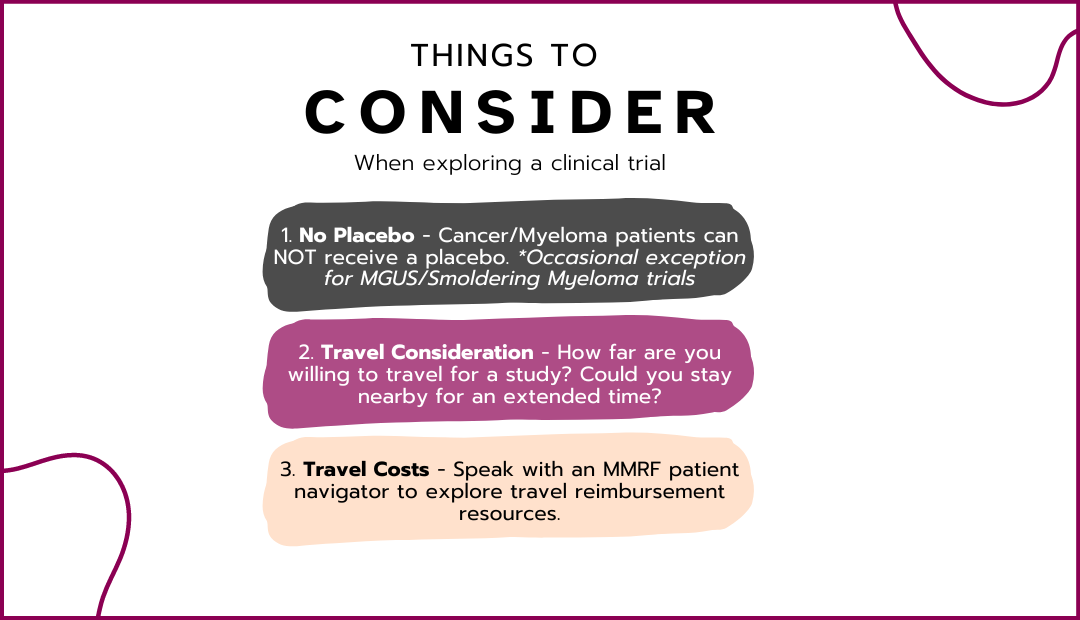ATRA and Carfilzomib in Plasma Cell Myeloma Patients
NCT06536413
Age 18 +
Sex Both
Phase Phase 1, Phase 2
Third Opinion Trial Synopsis
In this clinical study, researchers are exploring a new treatment approach for patients with a specific type of blood cancer. The study focuses on using a combination of therapies to improve patient outcomes. Here are some key details about the study:
- The treatment involves a combination of existing therapies and new methods to enhance effectiveness.
- It aims to target the cancer cells more precisely, potentially leading to better results and fewer side effects.
- Patients will receive personalized treatment plans based on their individual health needs and responses to therapy.
- The study includes a diverse group of participants to ensure the findings are applicable to a wide range of patients.
- Researchers are closely monitoring the effects of the treatment on both the cancer and the patients' overall health.
Third Opinion AI Generated Synopsis
Trial Summary
This is a Phase IB/II trial that will investigate the safety, tolerability and efficacy of combination therapy using All-Trans Retinoic Acid (ATRA) with Carfilzomib based therapies in plasma cell myeloma also commonly referred as Multiple Myeloma (MM), in patients considered refractory to proteasome inhibitors (PIs). Multiple myeloma is an incurable clonal plasma cell disorder that comprises 10% of all hematologic malignancies. Over the past 30 years the global prevalence of multiple myeloma has risen to 126%, with 85% of diagnoses occurring in patients \>55 years of age. In the past 15 years, survival has improved considerably, which is attributed to the development of multiple different classes of medications, including proteasome inhibitors. Proteasome inhibitors are the foundation of many multiple myeloma treatments in both transplant eligible and ineligible patients for the past 2 decades. While proteasome inhibitors have improved both progression free survival (PFS) and overall survival (OS), many patients eventually develop disease progression arising from resistance to therapies. As a result, there is an unmet need to overcome resistance and find ways to enhance multiple myeloma sensitivity to proteasome inhibitor toxicity. Carfilzomib, a modified peptide epoxyketone that selectively targets intracellular proteasome enzymes, is approved in combination with dexamethasone in patients that have received ≥1 line of therapy or in combination. There are few studies assessing ways to enhance carfilzomib-mediated multiple myeloma toxicity. All-Trans Retinoic Acid (ATRA) is an oxidative metabolite of retinol (vitamin A) and plays an important role in the regulation of cellular proliferation and differentiation. In a recent pre-clinical study, ATRA was found to enhance sensitivity of carfilzomib-mediated apoptosis in vitro via an interferon beta (IFN-β) response pathway. In the clinical setting, ATRA is a well-tolerated drug that has shown little change in the rate of adverse events in early clinical trials with multiple myeloma. The investigators hypothesize that ATRA enhances sensitivity of multiple myeloma to carfilzomib therapy.
This is a Phase IB/II trial that will investigate the safety, tolerability and efficacy of combination therapy using All-Trans Retinoic Acid (ATRA) with Carfilzomib based therapies in plasma cell myeloma also commonly referred as Multiple Myeloma (MM), in patients considered refractory to proteasome inhibitors (PIs). Multiple myeloma is an incurable clonal plasma cell disorder that comprises 10% of all hematologic malignancies. Over the past 30 years the global prevalence of multiple myeloma has risen to 126%, with 85% of diagnoses occurring in patients \>55 years of age. In the past 15 years, survival has improved considerably, which is attributed to the development of multiple different classes of medications, including proteasome inhibitors. Proteasome inhibitors are the foundation of many multiple myeloma treatments in both transplant eligible and ineligible patients for the past 2 decades. While proteasome inhibitors have improved both progression free survival (PFS) and overall survival (OS), many patients eventually develop disease progression arising from resistance to therapies. As a result, there is an unmet need to overcome resistance and find ways to enhance multiple myeloma sensitivity to proteasome inhibitor toxicity. Carfilzomib, a modified peptide epoxyketone that selectively targets intracellular proteasome enzymes, is approved in combination with dexamethasone in patients that have received ≥1 line of therapy or in combination. There are few studies assessing ways to enhance carfilzomib-mediated multiple myeloma toxicity. All-Trans Retinoic Acid (ATRA) is an oxidative metabolite of retinol (vitamin A) and plays an important role in the regulation of cellular proliferation and differentiation. In a recent pre-clinical study, ATRA was found to enhance sensitivity of carfilzomib-mediated apoptosis in vitro via an interferon beta (IFN-β) response pathway. In the clinical setting, ATRA is a well-tolerated drug that has shown little change in the rate of adverse events in early clinical trials with multiple myeloma. The investigators hypothesize that ATRA enhances sensitivity of multiple myeloma to carfilzomib therapy.
from ClinicalTrials.gov
Locations & Contact
Fill out the form and to let the Multiple Myeloma Research Foundation know you are interested in this trial.
Contacts:

